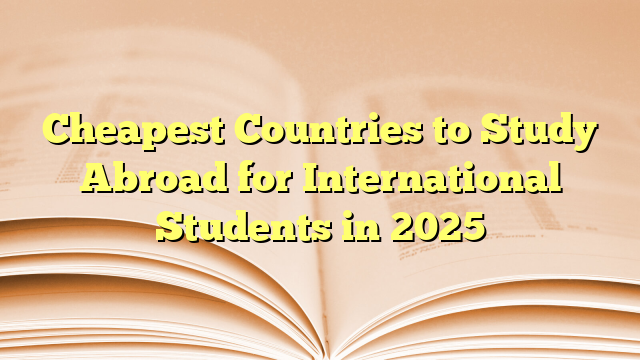As international education continues to evolve in 2025, students are no longer just looking for quality education alone—they are also seeking countries where they can work during and after their studies. The ability to gain work experience while studying and secure post-graduation employment is a crucial factor in choosing a study destination. This article explores the best countries to study and work abroad in 2025, highlighting key benefits, immigration policies, job opportunities, tuition fees, and available scholarships.
Factors to Consider When Choosing a Country to Study and Work
Before selecting a country, consider the following:
- Quality and global recognition of education
- Opportunities to work part-time during studies
- Post-study work visa or immigration pathways
- Cost of tuition and living expenses
- Availability of scholarships and financial aid
- Safety, healthcare, and student support
- Language of instruction and daily communication
Countries that offer both high-quality education and favorable work policies attract the most international students.
Canada
Canada consistently ranks as a top study destination for international students. In 2025, it remains a top choice for those seeking to study and gain work experience.
Part-Time Work: International students can work up to 20 hours per week during semesters and full-time during breaks.
Post-Study Work: Graduates are eligible for a Post-Graduation Work Permit (PGWP) of up to three years, which can lead to permanent residency.
Top Fields: Engineering, Healthcare, IT, Environmental Studies, Business.
Top Universities: University of Toronto, University of British Columbia, McGill University.
Scholarships: Vanier Canada Graduate Scholarships, Lester B. Pearson Scholarships, university-specific awards.
Language: English and French.
Immigration Pathway: Express Entry and Provincial Nominee Programs (PNPs) favor international graduates.
Germany
Germany is one of the most affordable and career-friendly countries in Europe for international students.
Part-Time Work: Students can work up to 120 full days or 240 half days per year.
Post-Study Work: Graduates can apply for an 18-month job-seeking visa, then transition to a work visa or permanent residence.
Top Fields: Engineering, Computer Science, Business, Renewable Energy.
Top Universities: Technical University of Munich, LMU Munich, Heidelberg University.
Scholarships: DAAD, Deutschlandstipendium, Erasmus+.
Language: Many programs in English; daily life may require basic German.
Cost: Most public universities charge low or no tuition fees.
Australia
Australia is a global leader in offering study-work opportunities with clear immigration pathways.
Part-Time Work: Students can work up to 48 hours every two weeks during term time.
Post-Study Work: The Temporary Graduate Visa (subclass 485) allows graduates to work for 2 to 4 years.
Top Fields: Nursing, Education, IT, Engineering, Agriculture.
Top Universities: University of Melbourne, University of Sydney, University of Queensland.
Scholarships: Australia Awards Scholarships, Research Training Program (RTP), university grants.
Language: English.
Migration: Skilled Migration Pathway available to graduates with in-demand skills.
United Kingdom
The UK has reintroduced generous post-study work options under the Graduate Route.
Part-Time Work: International students can work up to 20 hours per week during term.
Post-Study Work: Two-year post-study work visa (three years for PhD graduates).
Top Fields: Law, Medicine, Business, Creative Arts, Engineering.
Top Universities: University of Oxford, University of Cambridge, Imperial College London.
Scholarships: Chevening Scholarships, Commonwealth Scholarships, Gates Cambridge Scholarships.
Language: English.
Visa Transition: Graduates may switch to a Skilled Worker visa after securing employment.
United States
The U.S. offers top-tier education and opportunities to work through Optional Practical Training (OPT).
Part-Time Work: On-campus jobs allowed; off-campus requires special authorization.
Post-Study Work: OPT allows up to 12 months work post-graduation, 36 months for STEM.
Top Fields: Engineering, Medicine, Business, Computer Science.
Top Universities: Harvard University, MIT, Stanford University, University of California system.
Scholarships: Fulbright Program, AAUW, university-specific merit and need-based aid.
Language: English.
Migration: H-1B work visa is competitive but possible for top graduates.
Netherlands
The Netherlands offers many English-taught programs and a progressive work policy.
Part-Time Work: Students can work 16 hours per week during the academic year.
Post-Study Work: Orientation Year (zoekjaar) visa allows graduates to live and find work for one year.
Top Fields: Logistics, Water Management, Engineering, Economics.
Top Universities: University of Amsterdam, Delft University of Technology, Leiden University.
Scholarships: Holland Scholarship, Erasmus+, Orange Knowledge Programme.
Language: English-taught programs widely available; Dutch needed for local jobs.
Cost: Moderate tuition with affordable living in student cities.
Ireland
Ireland is growing rapidly as a tech and business hub, offering great post-study options.
Part-Time Work: Up to 20 hours per week during term; 40 hours during holidays.
Post-Study Work: 12 months for bachelor’s, 24 months for master’s graduates under the Third Level Graduate Scheme.
Top Fields: Information Technology, Data Analytics, Business, Pharmaceuticals.
Top Universities: Trinity College Dublin, University College Dublin, University of Galway.
Scholarships: Government of Ireland Scholarships, university-specific merit grants.
Language: English.
Visa Pathway: Employment permit system for skilled graduates.
Norway
Norway offers tuition-free education in public universities and high standards of living.
Part-Time Work: Up to 20 hours per week.
Post-Study Work: Graduates can apply for a job search permit for one year.
Top Fields: Engineering, Natural Sciences, Humanities.
Top Universities: University of Oslo, Norwegian University of Science and Technology (NTNU).
Scholarships: Quota Scheme (discontinued), but several institutional awards remain.
Language: Many master’s programs in English.
Cost: No tuition, but high cost of living.
Finland
Finland provides high-quality education, especially in engineering and technology.
Part-Time Work: Students may work up to 30 hours per week.
Post-Study Work: One-year residence permit after graduation to seek employment.
Top Fields: Engineering, Computer Science, Education.
Top Universities: University of Helsinki, Aalto University, Tampere University.
Scholarships: Finland Scholarship, university-specific offers.
Language: Many programs in English; Finnish helps with part-time jobs.
Cost: Moderate to low tuition and living costs.
New Zealand
New Zealand is ideal for students looking for work-study balance and a pathway to residency.
Part-Time Work: 20 hours per week during term.
Post-Study Work: One to three years depending on level of qualification.
Top Fields: Tourism, Agriculture, Engineering, Business.
Top Universities: University of Auckland, University of Otago, Victoria University of Wellington.
Scholarships: New Zealand Scholarships, Commonwealth Scholarships.
Language: English.
Immigration: Work to Residence pathway open to international graduates.
Comparison Table
| Country | Work During Study | Post-Study Work | Language | Scholarships Available |
|---|---|---|---|---|
| Canada | 20 hrs/week | Up to 3 years | English/French | Yes |
| Germany | 120 days/year | 18 months | German/English | Yes |
| Australia | 48 hrs/2 weeks | 2–4 years | English | Yes |
| UK | 20 hrs/week | 2–3 years | English | Yes |
| USA | On-campus only | 1–3 years OPT | English | Yes |
| Netherlands | 16 hrs/week | 1 year | English | Yes |
| Ireland | 20 hrs/week | 1–2 years | English | Yes |
| Norway | 20 hrs/week | 1 year | English | Yes |
| Finland | 30 hrs/week | 1 year | English | Yes |
| New Zealand | 20 hrs/week | 1–3 years | English | Yes |
Tips for Choosing the Right Country
- If your goal is to migrate after studies, consider Canada or Australia
- If affordability is your top concern, look into Germany or Norway
- If you want access to world-class research, choose the USA or UK
- If you’re seeking scholarships for English-taught programs, explore Ireland, Finland, or the Netherlands
- If tech and innovation are your fields, consider New Zealand or Germany
Final Thoughts
In 2025, students no longer need to choose between studying abroad and working abroad. Countries like Canada, Australia, Germany, and the UK offer attractive packages for international students, combining education with valuable work experience. With favorable immigration policies, growing job markets, and scholarship support, these destinations provide the opportunity to study, work, and build a future career abroad. Start by evaluating your goals, researching scholarship options, and applying early to take advantage of the opportunities available in these top countries.






